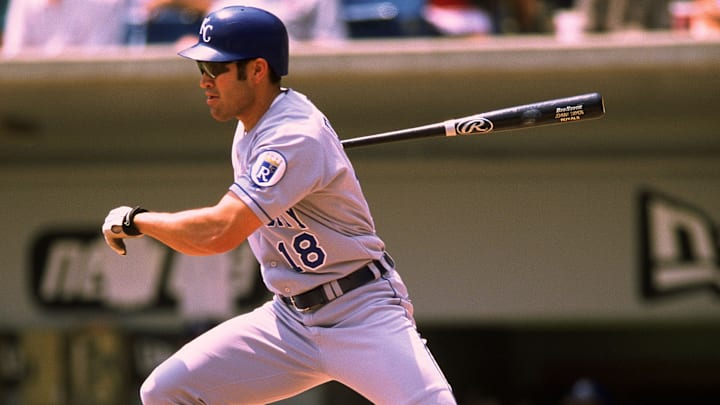On a mild late-fall Kauffman Stadium evening, with his Kansas City Royals trailing the Detroit Tigers by two with one out in the eighth inning of their last home game of the 20th century's final season, KC center fielder Johnny Damon slapped an RBI single to bring his club within one run. The Royals scored four more times before the inning ended, reliever Ricky Bottalico held Detroit scoreless in the ninth, and the Royals won 8-5.
It was September 28, 2000. Damon, a fan favorite and one of the best center fielders in franchise history, would never bat in Kansas City as a Royal again. Just a little more than three months later — on January 8, 2001, and well after the club finished its 15th straight season without a playoff appearance — Kansas City made Damon the centerpiece of a three-team trade that was nothing less than a disaster for the Royals.
The seeds of that debacle were in the specifics of the deal. Knowing they'd be unable to meet Damon's requirements when he tested free agency for the first time after the 2001 season, and determined to get something for him before that could happen, the fiscally conservative Royals shipped Damon and minor league infielder Mark Ellis to the Oakland Athletics for infielder Ángel Berroa and catcher A.J. Hinch. The A's dealt outfielder Ben Grieve to the Tampa Bay Devil Rays and received pitcher Cory Lidle in return, and the Rays shipped pitcher Robert Hernández to KC.
Trading Damon paid few dividends.
The Johnny Damon trade turned out badly for the KC Royals
Even casual observers of the Royals realized how lopsided Kansas City's side of the triangular trade would turn out to be. Damon, who KC took with one of its two first-round supplemental picks in the 1992 amateur draft, made it to the Royals in 1995, and by the time he was traded, he'd given them 65 homers, 156 doubles, 47 triples, 352 RBI, and batted .292 with a .351 OBP. His propensity to find his way on base resulted in 156 stolen bases — he led the American League with 46 in 2000 — and his defense was good enough to be trusted with the challenging expanse of Kauffman Stadium's center field.
Damon was also a big favorite of the fans, who viewed him as a player that could help lead the Royals out of the long playoff drought they'd been in since winning the 1985 World Series.
Instead, Damon's time in Kansas City ended after the 2000 campaign. The Royals had become David Glass's team, and trading Damon foretold the fiscal restraint that would so dominate most of the Glass reign. Combine that with the high salary and big multi-year deal Damon was sure to command on the free agent market, and the picture became clear — there was no more financial room left for Damon on a Royals roster.
Damon's concerns that the Royals might not keep their developing core were no secret, and may have even been part of the dynamic that triggered the trade. Still, KC general manager Allard Baird told ESPN at the time, "If we had felt for one minute that we could sign Johnny to a long-term deal, then obviously we would not have made this deal."
Of course, Damon went on to greater things. His career lasted another dozen seasons, he played on two World Series-winning teams (Boston Red Sox and New York Yankees), and finished his seven-team career in 2012 with a .284/.352/.433 line, 2,769 hits, 235 homers, 1,139 RBI, and 408 steals. He also made two AL All-Star teams.
And what of Berroa, Hernández, and Hinch (Kansas City's net return for Damon)? While Ellis, the other Royal involved in the deal, went on to a fine career with Oakland, Berroa eventually became a serviceable shortstop for Kansas City (he was AL Rookie of the Year in 2003), Hernández went 6-9 with a 4.21 ERA before leaving for free agency after two seasons, and Hinch hit .214 as a two-year Royals part-timer. He managed the 2017 cheating scandal Houston team and now skippers the Tigers.
Simply put, the Royals sorely missed Damon. They went from 77-85 in 2000 to 65-97 in their first season without him and 62-100 the following year. And by Opening Day of 2003, two of the three players they received in the infamous Damon deal were no longer Royals.
What's next for Johnny Damon and Kansas City?
Damon may never land a plaque in the National Baseball Hall of Fame, but he's said this about what he'd like to have happen if he ever does: "People ask me and I tell them that I'd like to wear the Kansas City Royals hat. It was my team, unfortunately I didn't win a championship with them but I always wanted to come back, always wanted to put that Royals jersey back on but they had their young guys coming up and I was just getting older, they ended up doing a fantastic job."
Damon probably won't make it to Cooperstown, but he deserves and should get a place in the Royals Hall of Fame when the 2025 class is announced.
